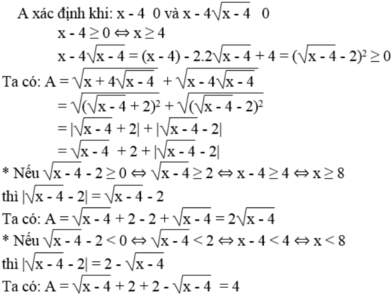tìm x: 4x+4-4x= 4080

Những câu hỏi liên quan
Tìm Min :
a, Y = (x+2)(x+3)(x+4)(x+5) - 24
b, Y= (4x+1)(4x+2)(4x+3)(4x+4)-3
tìm x:4^x+4- 4^x=4080
`4^x + 4 - 4^x = 4080`
`=> (4^x - 4^x) + 4 = 4080`
`=> 0 + 4 = 4080`
`=> 4 = 4080 (\text {vô lý})`
Vậy, không có giá trị nào của `x` thỏa mãn.
Đúng 1
Bình luận (5)
\(4^{x+4}-4^x=4080\)
\(\Leftrightarrow4^x\left(4^4-1\right)=4080\)
\(\Leftrightarrow4^x.255=4080\)
\(\Leftrightarrow4^x\approx16\)
\(\Leftrightarrow x\approx2\)
(Nếu mik đọc sai đề mong bn thông cảm)
Đúng 1
Bình luận (1)
`4^(x + 4) - 4^x = 4080`
`=> 4^x * 4^4 - 4^x = 4080`
`=> 4^x * (4^4 - 1) = 4080`
`=> 4^x * (256 - 1) = 4080`
`=> 4^x *255 = 4080`
`=> 4^x = 4080 \div 255`
`=> 4^x = 16`
`=> 4^x = 4^2`
`=> x = 2`
Vậy, `x = 2.`
Đúng 1
Bình luận (1)
Tìm số nguyên �x thỏa mãn �24.4.4.4x24.4.4.4.
�−16x−16 hoặc �16x16.
�−4x−4 hoặc �4x4.
�4x4.
�16x16.
Đọc tiếp
Tìm số nguyên thỏa mãn .
hoặc . hoặc . . .Lời giải:
$x^2=4.4.4.4=16.16=(-16)(-16)=16^2=(-16)^2$
$\Rightarrow x=16$ hoặc $x=-16$.
Đúng 0
Bình luận (0)
tìm x , biết
a. 4x(x-5)-(x-1)(4x-3)=5
b. (3x-4)(x-2) = 3x(x-9)-3
c.2(x+3)-x2 -3x=0
d. 8x3-50x=0
e. (4x-30)2-3x(3-4x)
\(a,\Rightarrow4x^2-20x-4x^2+3x+4x-3=5\\ \Rightarrow-13x=8\Rightarrow x=-\dfrac{8}{13}\\ b,\Rightarrow3x^2-10x+8-3x^2+27x=-3\\ \Rightarrow17x=-11\Rightarrow x=-\dfrac{11}{17}\\ c,\Rightarrow\left(x+3\right)\left(2-x\right)=0\Rightarrow\left[{}\begin{matrix}x=-3\\x=2\end{matrix}\right.\\ d,\Rightarrow2x\left(4x^2-25\right)=0\\ \Rightarrow2x\left(2x-5\right)\left(2x+5\right)=0\Rightarrow\left[{}\begin{matrix}x=0\\x=\dfrac{2}{5}\\x=-\dfrac{2}{5}\end{matrix}\right.\\ e,Sửa:\left(4x-3\right)^2-3x\left(3-4x\right)=0\\ \Rightarrow\left(4x-3\right)^2+3x\left(4x-3\right)=0\\ \Rightarrow\left(4x-3\right)\left(7x-3\right)=0\Rightarrow\left[{}\begin{matrix}x=\dfrac{3}{4}\\x=\dfrac{3}{7}\end{matrix}\right.\)
Đúng 1
Bình luận (0)
a.
4x(x-5) - (x-1)(4x-3)-5=0
4x^2-20x-4x^2+3x+4x+3=0
(4x^2-4x^2)+(-20x+3x+4x)+3=0
13x+3 = 0
13x=-3
x=-3/13
b,
(3x-4)(x-2)-3x(x-9)+3=0
3x^2-6x-4x+8 - 3x^2+27x+3=0
(3x^2-3x^2)+(-6x-4x+27x)+(8+3)=0
17x+11=0
17x=-11
x=-11/17
c, 2(x+3)-x^2-3x=0
2(x+3) - x(x+3)=0
(x+3)(2-x)=0
TH1: x+3 = 0; x=-3
TH2: 2-x=0;x=2
Đúng 0
Bình luận (0)
Tìm GTNN của biểu thức:
a)A=x(x+3)(x-1)(x-4)
b)B=B=4x^4+4x^3+5x^2+4x+3
Mình đang cần gấp giúp mình với ạ
\(a,A=\left(x^2-x\right)\left(x^2-x-12\right)\\ A=\left(x^2-x\right)^2-12\left(x^2-x\right)\\ A=\left(x^2-x\right)^2-12\left(x^2-x\right)+36-36\\ A=\left(x^2-x+6\right)^2-36\ge-36\\ A_{min}=-36\Leftrightarrow x^2-x+6=0\Leftrightarrow\left(x-3\right)\left(x+2\right)=0\Leftrightarrow\left[{}\begin{matrix}x=3\\x=-2\end{matrix}\right.\\ b,B=4x^4+4x^3+5x^2+4x+3\\ B=\left(4x^4+4x^3+x^2\right)+\left(x^2+4x+4\right)-1\\ B=x^2\left(2x+1\right)^2+\left(x+2\right)^2-1\ge-1\\ B_{min}=-1\Leftrightarrow\left\{{}\begin{matrix}x\left(2x+1\right)=0\\x+2=0\end{matrix}\right.\Leftrightarrow x\in\varnothing\)
Vậy dấu \("="\) không xảy ra
Đúng 2
Bình luận (0)
Tìm GTNN:
a) \(\dfrac{1}{-x^2+2x-4}\)
b) \(\dfrac{12}{12x-4x^2-13}\)
c) \(\dfrac{x^2-4x-4}{x^2-4x+5}\)
d) \(\dfrac{15}{-6x^2-5y^2+10xy-4x+10y-19}\)
e)\(\dfrac{x^2-2011}{4.\left(x^2+1\right)}\)
a: \(-x^2+2x-4\)
\(=-\left(x^2-2x+4\right)\)
\(=-\left(x^2-2x+1+3\right)\)
\(=-\left\lbrack\left(x-1\right)^2+3\right\rbrack=-\left(x-1\right)^2-3\le-3\forall x\)
=>\(\frac{1}{-x^2+2x-4}\ge-\frac13\forall x\)
Dấu '=' xảy ra khi x-1=0
=>x=1
b: \(-4x^2+12x-13\)
\(=-\left(4x^2-12x+13\right)\)
\(=-\left(4x^2-12x+9+4\right)\)
\(=-\left\lbrack\left(2x-3\right)^2+4\right\rbrack=-\left(2x-3\right)^2-4\le-4\forall x\)
=>\(\frac{12}{-4x^2+12x-13}\ge\frac{12}{-4}=-3\forall x\)
Dấu '=' xảy ra khi 2x-3=0
=>2x=3
=>\(x=\frac32\)
c: Đặt \(A=\frac{x^2-4x-4}{x^2-4x+5}\)
\(=\frac{x^2-4x+5-9}{x^2-4x+5}\)
\(=1-\frac{9}{x^2-4x+5}\)
Ta có: \(x^2-4x+5\)
\(=x^2-4x+4+1\)
\(=\left(x-2\right)^2+1\ge1\forall x\)
=>\(\frac{9}{\left(x-2\right)^2+1}\le\frac91=9\forall x\)
=>\(-\frac{9}{\left(x-2\right)^2+1}\ge-9\forall x\)
=>\(A=-\frac{9}{\left(x-2\right)^2+1}+1\ge-9+1=-8\forall x\)
Dấu '=' xảy ra khi x-2=0
=>x=2
e: Đặt \(B=\frac{x^2-2011}{4\left(x^2+1\right)}\)
\(=\frac14\cdot\frac{4x^2-8044}{4x^2+4}=\frac14\cdot\frac{x^2-2011}{x^2+1}=\frac14\left(\frac{x^2+1-2012}{x^2+1}\right)=\frac14\left(1-\frac{2012}{x^2+1}\right)\)
Ta có: \(x^2+1\ge1\forall x\)
=>\(\frac{2012}{x^2+1}\le2012\forall x\)
=>\(-\frac{2012}{x^2+1}\ge-2012\forall x\)
=>\(1-\frac{2012}{x^2+1}\ge-2012+1=-2011\forall x\)
=>\(\frac14\left(1-\frac{2012}{x^2+1}\right)\ge-\frac{2011}{4}\forall x\)
Dấu '=' xảy ra khi x=0
Đúng 0
Bình luận (0)
` P = ( (3+x)/(3-x) - (3-x)/(3+x) - (4x^2)/( x^2-9) ) . ( (5)/(3-x) - (4x+2)/(3x-x^2) ) `
a) Rút gọn
b) Tính P với `x^2 - 4x + 3 = 0 `
c) Tìm x để P > 0
d) Tìm x thuộc Z để P thuộc Z
e) Tìm x để P = -4
g) Tìm GTNN của P với x thuộc Z
h) Tìm x để P > 4x
a:
Sửa đề: \(P=\left(\dfrac{3+x}{3-x}-\dfrac{3-x}{3+x}-\dfrac{4x^2}{x^2-9}\right):\left(\dfrac{5}{3-x}-\dfrac{4x+2}{3x-x^2}\right)\)\(P=\left(\dfrac{-\left(x+3\right)}{x-3}+\dfrac{x-3}{x+3}-\dfrac{4x^2}{\left(x-3\right)\left(x+3\right)}\right):\dfrac{5x-4x-2}{x\left(3-x\right)}\)
\(=\dfrac{-x^2-6x-9+x^2-6x+9-4x^2}{\left(x-3\right)\left(x+3\right)}:\dfrac{x-2}{x\left(3-x\right)}\)
\(=\dfrac{-4x^2-12x}{\left(x-3\right)\left(x+3\right)}\cdot\dfrac{x\left(3-x\right)}{x-2}\)
\(=\dfrac{-4x\left(x+3\right)}{\left(x-3\right)\left(x+3\right)}\cdot\dfrac{-x\left(x-3\right)}{x-2}=\dfrac{4x^2}{x-2}\)
b: x^2-4x+3=0
=>x=1(nhận) hoặc x=3(loại)
Khi x=1 thì \(P=\dfrac{4\cdot1^2}{1-2}=-4\)
c: P>0
=>x-2>0
=>x>2
d: P nguyên
=>4x^2 chia hết cho x-2
=>4x^2-16+16 chia hết cho x-2
=>x-2 thuộc {1;-1;2;-2;4;-4;8;-8;16;-16}
=>x thuộc {1;4;6;-2;10;-6;18;-14}
Đúng 2
Bình luận (0)
bài 1:cho P(x)=5x^5+3x-4x^4-2x^3+6+4x^2 và Q(x)=4x^4+7x+2x^3+1/4-5x^5-4x^2
a)sắp xếp các hạng tử của mỗi đa thức trên theo lũy thừa giảm dần của biến và tìm bậc của chúng
b)tính H(x)=P(x)+Q(x)
c)tìm x để H(x)=0
a: \(P\left(x\right)=5x^5-4x^4-2x^3+4x^2+3x+6\)
Bậc là 5
\(Q\left(x\right)=-5x^5+4x^4+2x^3-4x^2+7x+\dfrac{1}{4}\)
Bậc là 5
b: H(x)=P(x)+Q(x)
\(=5x^5-4x^4-2x^3+4x^2+3x+6-5x^5+4x^4+2x^3-4x^2+7x+\dfrac{1}{4}\)
=10x+6,25
c: Để H(x)=0 thì 10x+6,25=0
hay x=-0,625
Đúng 0
Bình luận (0)
Tìm điều kiện xác định và rút gọn biểu thức: A = x + 4 x - 4 + x - 4 x - 4




















